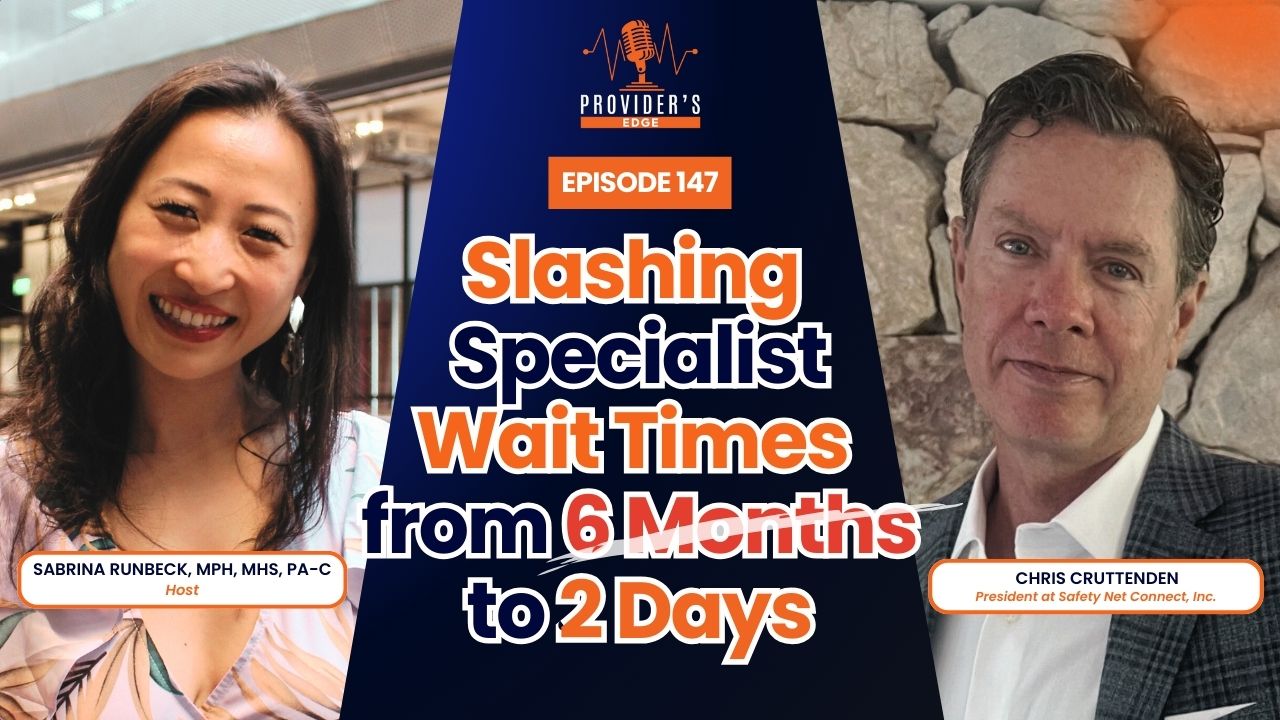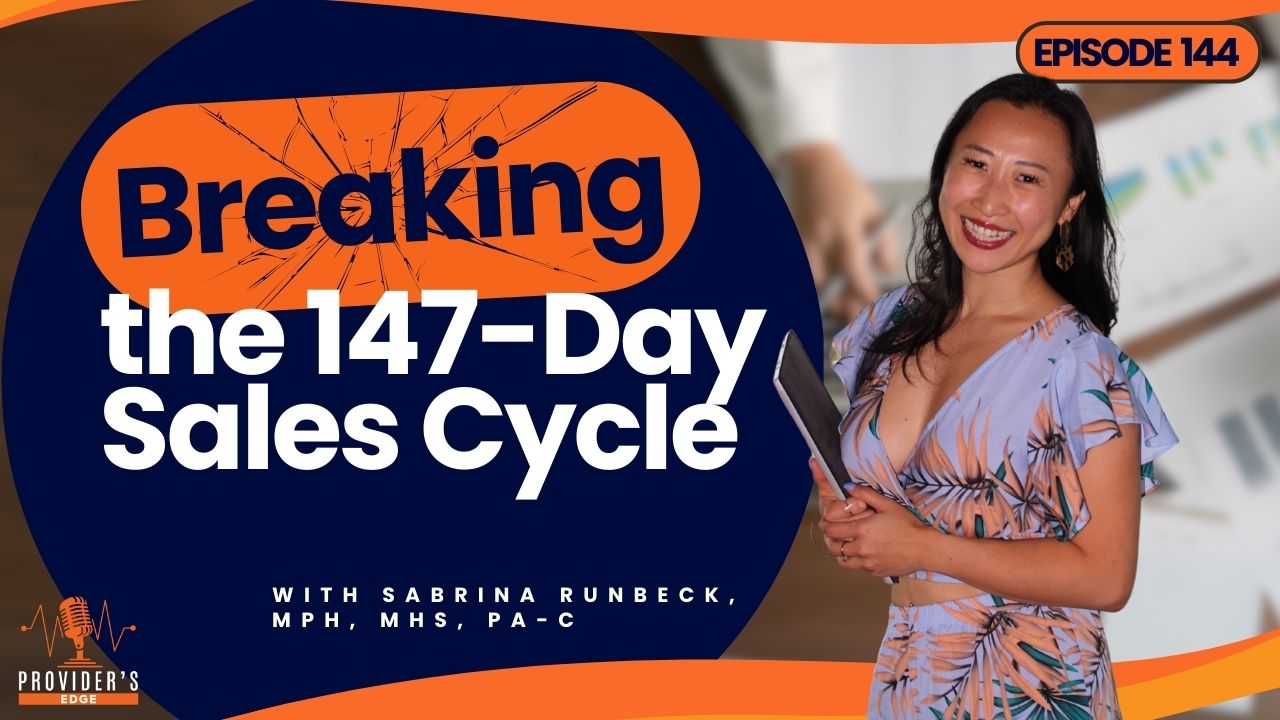
6 Months to 2 Days:
Slashing Specialist Wait Times for Healthcare Tech Founders
"We reduced as a case study in LA County, where it was six months for a GI doc, down to best practice, which was usually two days for co-management and access to the specialist." - Chris Cruttenden, SafetyNet Connect
Did you know that patients in some healthcare systems wait up to six months just to see a specialist? This isn't just an inconvenience—it's a healthcare crisis affecting millions of patients, leading to poorer outcomes, increased ER visits, and skyrocketing healthcare costs.
As healthcare tech founders, you're uniquely positioned to solve this critical challenge. The specialist referral bottleneck represents not just a patient care problem, but also a massive business opportunity that's being overlooked by many in our industry.
Listen anywhere you get your podcastin' on.
Live Interview

#1 Hidden Cost of Specialist Wait Times
When patients can't access specialists quickly, the consequences ripple throughout the healthcare system. Primary care physicians become overwhelmed, patients suffer without proper treatment, and costs spiral as patients resort to emergency departments for care that could have been handled more efficiently. The traditional referral process—what some call "flipping patients over the wall"—creates disconnected care experiences where primary care and specialists operate in silos. Patients are left bouncing between providers, often repeating tests and facing treatment delays.
I've seen this firsthand with patients who get "lost" in the system after being referred from ERs to community clinics. Without proper follow-up, they cycle back to emergency rooms for conditions that could be managed effectively with proper specialist input. This creates a costly cycle for both patients and healthcare systems while preventing meaningful improvement in health outcomes.
#2 The E-Consultation Revolution
The solution isn't just more specialists—it's smarter communication between existing providers. E-consultation systems create an asynchronous communication channel between primary care and specialists that dramatically reduces wait times while improving care coordination. Unlike traditional telehealth that requires synchronous video connections, e-consultation leverages store-and-forward technology to enable specialists to review cases during downtime. This approach makes much more efficient use of specialist time—they can review 15 e-consults in an hour versus seeing perhaps 15 patients in an entire day.
The impact is remarkable. In LA County, e-consultation reduced specialist wait times from six months to just two days for co-management decisions, with in-person appointments scheduled within a couple of weeks when necessary. This dramatic improvement didn't require hiring more specialists—it simply optimized the existing workflow through better communication channels.
#3 Why Healthcare Tech Founders Should Take Notice
If you're building in the healthcare technology space, the specialist access problem represents a major opportunity. The market extends far beyond Medicaid systems—though that's an excellent starting point with demonstrated success. What makes this opportunity especially compelling is its alignment with value-based care models. By reducing unnecessary specialist visits and ER utilization while improving care coordination, these solutions deliver exactly the metrics that matter in today's healthcare economy.
The applications span both urban and rural environments. As one industry leader noted: "There is a desert of doctors in a very urban situation, but then you have these really rural and even frontier areas." When patients must drive 2-3 hours to see a specialist, technology-enabled co-management becomes essential.
#4 Building a Sustainable Healthcare Communication Business
Creating a successful healthcare communication platform requires deep attention to several key factors. EMR integration is absolutely critical. "More seamless integration would be connected to every EMR, and there would be no barriers to access in the workflow for the primary care physician." Without this integration, even the best solution becomes another portal that providers must log into, creating friction rather than solving it.
Provider education creates ongoing value that strengthens your business model. When primary care doctors engage with specialists through these platforms, they become better equipped to handle similar cases independently in the future. This educational component creates a virtuous cycle where the system becomes more efficient over time, building loyalty to your platform.
AI can enhance clinical efficiency in ways that magnify your impact. Today's specialists are drowning in documentation. AI-powered tools that summarize patient histories and highlight relevant findings can dramatically increase the number of cases specialists can review effectively, making your solution more valuable to all stakeholders.
The most successful business models in this space focus on enabling an ecosystem rather than building a walled garden. By providing technology that allows health systems and specialist groups to collaborate more effectively, you create much more value than by trying to build a self-contained network.
#5 Next Steps for Healthcare Tech Founders
If you're considering entering this space, start by examining the specific pain points in your target healthcare systems. The specialist referral process is different across settings, and understanding the nuances is critical. Consider how your solution will integrate with existing EMR systems, as this remains the greatest challenge to adoption. Look for partners who can help bridge these integration gaps rather than trying to solve everything yourself. Most importantly, recognize that healthcare technology is fundamentally about enabling human connections, not replacing them. The most successful platforms enhance communication between providers rather than attempting to automate clinical decision-making entirely.
"We never do things by ourselves, it's always a whole slew of team, the right support, and that is what's gonna drive the next level of push."
Conclusion: Building Bridges for Better Healthcare
The specialist access challenge represents a perfect opportunity for healthcare tech founders who understand the power of collaborative solutions. By focusing on the communication gap between providers, you can create substantial value for patients, providers, and healthcare systems while building a sustainable business. The e-consultation revolution isn't just about technology—it's about reimagining care coordination in a way that benefits everyone involved.
For healthcare tech founders generating significant revenue or with substantial funding, this represents an opportunity to create meaningful impact while addressing a clear market need. The barriers to specialist access won't be solved by incremental improvements but rather by rethinking the communication infrastructure that connects our healthcare system.
As you build your healthcare technology solutions, remember that the most valuable innovations often come from enhancing human connections rather than replacing them. By facilitating better provider-to-provider communication, you can help transform healthcare delivery while creating a sustainable business model aligned with where healthcare is heading.
Is your healthcare tech venture addressing provider communication challenges?
What integration hurdles have you encountered, and how are you overcoming them?
I'd love to hear about your experiences in the comments below.
Recommended Podcast Episodes
70% of healthcare technology solutions struggle with patient engagement beyond the initial implementation phase.
Healthcare innovation is challenging for everyone, but for women founders in women's health...
Be a guest on our show
The Provider's Edge show is always looking to feature healthcare change-makers and celebrate the work they are doing to improve healthcare.
Together, we can encourage other healthcare entrepreneurs and startup founders to up-level their businesses.
If you or someone you know could be a good fit as a guest on the show, please click on the bottom below to apply as a speaker.
Healthcare Entrepreneurs!
I can help you gain visibility and credibility in the right circles so you can accelerate your mission and profitability!
After overcoming burnout working in surgery, I went back to my roots in neuroscience and public health. I learned the importance of building key human relationships with my team throughout our organization.
While helping healthcare executives and entrepreneurs to get out of the day-to-day operation of their practice, I realized I needed more visibility and more connections to reach my ideal clients.
Once I set out to be highly visible in the right circles, I was able to leverage my network of strategic partners to convert clients 5x higher than any other marketing channel I had tried previously.
Now I help healthcare change-makers to accelerate their impact and increase profitability by gaining visibility and credibility with the right strategic partners.
My clients no longer worry about where their next client is coming from, the need to plan additional budget for ads spending, or losing the ability to connect with others because their social media account is shut down.
If you want to share your social mission with the world and gain pivotal supporters that become loyal clients... then you are in the right place, with the right consultant who is also a recovered clinician.




